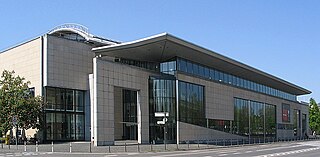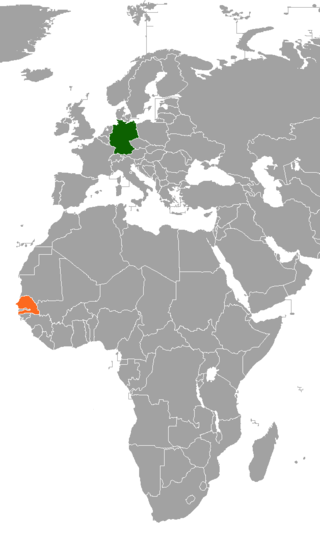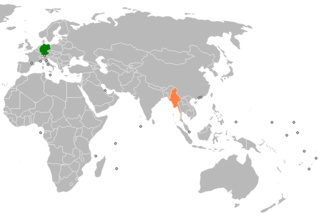
East Germany, officially known as the German Democratic Republic, was a country in Central Europe from its formation on 7 October 1949 until its reunification with West Germany on 3 October 1990. Until 1989, it was generally viewed as a communist state and described itself as a socialist "workers' and peasants' state". The economy of the country was centrally planned and state-owned. Although the GDR had to pay substantial war reparations to the Soviets, its economy became the most successful in the Eastern Bloc.

West Germany is the common English name for the Federal Republic of Germany from its formation on 23 May 1949 until its reunification with East Germany on 3 October 1990. It is sometimes known as the Bonn Republic after its capital city of Bonn. During the Cold War, the western portion of Germany and the associated territory of West Berlin were parts of the Western Bloc. West Germany was formed as a political entity during the Allied occupation of Germany after World War II, established from 12 states formed in the three Allied zones of occupation held by the United States, the United Kingdom, and France.

The Hallstein Doctrine, named after Walter Hallstein, was a key principle in the foreign policy of the Federal Republic of Germany from 1955 to 1970. As usually presented, it prescribed that the Federal Republic would not establish or maintain diplomatic relations with any state that recognized the German Democratic Republic. In fact it was more nuanced. There was no public official text of the "doctrine", but its main architect, Wilhelm Grewe, explained it publicly in a radio interview. Konrad Adenauer, who served as Chancellor of Germany from 1949 to 1963, explained the outlines of the policy in a statement to the German parliament on 22 September 1955. It meant that the Federal German government would regard it as an unfriendly act if third countries were to recognize the "German Democratic Republic" or to maintain diplomatic relations with it – with the exception of the Soviet Union. The West German response to such could mean breaking off diplomatic relations, though this was not stated as an automatic response under the policy and in fact remained the ultima ratio.

Neue Ostpolitik, or Ostpolitik for short, was the normalization of relations between the Federal Republic of Germany and Eastern Europe, particularly the German Democratic Republic beginning in 1969. Influenced by Egon Bahr, who proposed "change through rapprochement" in a 1963 speech at the Evangelische Akademie Tutzing, the policies were implemented beginning with Willy Brandt, fourth Chancellor of the FRG from 1969 to 1974, and winner of the 1971 Nobel Prize for Peace for his efforts to place this policy at the acme of the FRG.
German Reich was the constitutional name for the German nation state that existed from 18 January 1871 to 5 June 1945. The Reich became understood as deriving its authority and sovereignty entirely from a continuing unitary German Volk, with that authority and sovereignty being exercised at any one time over a unitary German "state territory" with variable boundaries and extent. Although commonly translated as "German Empire", the word Reich here better translates as "realm" or territorial "reach", in that the term does not in itself have monarchical connotations.
BRD is an unofficial abbreviation for the Federal Republic of Germany, informally known in English as West Germany until 1990, and just Germany since reunification. It was occasionally used in the Federal Republic itself during the early Cold War; it was commonly used between 1968 and 1990 by the ruling party of the German Democratic Republic, resulting in a strong deprecation of its use in West Germany. The East German regime had previously used the term "German Federal Republic", which it abbreviated as "DBR", to refer to West Germany. The most widely used abbreviation for West Germany in the country itself was its ISO 3166-1 alpha-2 country code "DE", which has remained the country code of reunified Germany.
The Basic Treaty is the shorthand name for the Treaty concerning the basis of relations between the Federal Republic of Germany and the German Democratic Republic. The Federal Republic of Germany and German Democratic Republic (GDR) recognized each other as sovereign states for the first time, an abandonment of West Germany's Hallstein Doctrine in favor of Ostpolitik.
The Council of Ministers was the cabinet and executive branch of the German Democratic Republic from November 1950 until the country was reunified on 3 October 1990. Originally formed as a body of 18 members, by 1989 the council consisted of 44 members.

Haus der Geschichte is a museum of contemporary history in Bonn, Germany. With around one million visitors every year, it is one of the most popular German museums. The Haus der Geschichte is part of the Haus der Geschichte der Bundesrepublik Deutschland Foundation, alongside the "Zeitgeschichtliches Forum Leipzig", the "Tränenpalast" at Berlin Friedrichstraße station and the "Museum in the Kulturbrauerei". The foundation's headquarters is in Bonn.

Diplomatic relations exist between Australia and Germany, as well as the historical contacts, shared values of democracy and human rights, substantial commercial links, and a keen interest in each other's culture. As part of a strategic partnership concluded in 2013, both nations are also increasingly cooperating on security policy issues. Both countries also maintain diplomatic relations in each other's countries.
A de facto embassy is an office or organisation that serves de facto as an embassy in the absence of normal or official diplomatic relations among countries, usually to represent nations which lack full diplomatic recognition, regions or dependencies of countries, or territories over which sovereignty is disputed. In some cases, diplomatic immunity and extraterritoriality may be granted.

Thomas Ammer is a German historian who as a young man studied to become a physician. He was arrested and imprisoned in 1958 for anti-government political activism in East Germany and he never qualified as a medical doctor. His 15-year prison sentence was cut short in August 1964 when his release was purchased by the West German government, and at the age of 27 he relocated to the German Federal Republic.
The Taipei Representative Office in the Federal Republic of Germany; represents the interests of Taiwan in Germany in the absence of formal diplomatic relations, functioning as a de facto embassy.

The Bundespressekonferenz (BPK) is a union of journalists that report exclusively for German media, and who primarily report from Berlin and Bonn. Following the model of the journalists of the Weimar Republic, the association invites representatives of the German government, as well as political parties, associations and individuals of national political, economic, and social interest to press conferences. It is financed solely through membership fees. Membership of the Bundespressekonferenz is limited exclusively to German journalists that report from either Bonn or Berlin. In December 2020 It has 900 parliamentary correspondents. The most important committee is the general assembly, which appoints the 8 members of the board, who take turns leading press conferences.

The visit of Erich Honecker to West Germany took place between 7–11 September 1987 in his official capacity as General Secretary of the Socialist Unity Party of Germany (SED) and Chairman of the State Council of the German Democratic Republic. It was the first and only visit of this kind undertaken during the partition of Germany. The five-day event was rated as an important step in the development of cross-German relations as well as Ostpolitik, which was implemented beginning with Willy Brandt, Chancellor of West Germany from 1969 to 1974.

Inner German relations, also known as the FRG-GDR relations, East Germany-West Germanyrelations or German-German relations, were the political, diplomatic, economic, cultural and personal contacts between the Federal Republic of Germany and the German Democratic Republic, at the period of the West-East division in German history from the founding of East Germany on 7 October 1949 to Germany's reunification on 3 October 1990.

German-Uganda relations have existed since 1962 and are described by the German Foreign Office as "positive". Uganda is one of the priority countries of German development aid and more than 100 associations and initiatives from Germany support humanitarian projects in Uganda.

Germany–Senegal relations are the bilateral relations between Germany and Senegal. The relations are described by the German Foreign Office as "friendly." The two countries share a close partnership in development cooperation, and numerous cultural ties exist between the two countries.

In 2014, the Federal Republic of Germany and the Republic of the Union of Myanmar celebrated the 60th anniversary of Germany–Myanmar relations.

Germany–Palestine are relations between the Federal Republic of Germany and the State of Palestine. Germany does not recognize Palestine diplomatically. However, Germany has a Representation Office in Ramallah, while there is also a Palestinian Mission in Berlin. There are numerous contacts between both societies, and Germany provides economic support to the Palestinian Territories through development partnerships. Germany is diplomatically committed to a two-state solution and has acted as a mediator in the Arab–Israeli conflict in the past.















